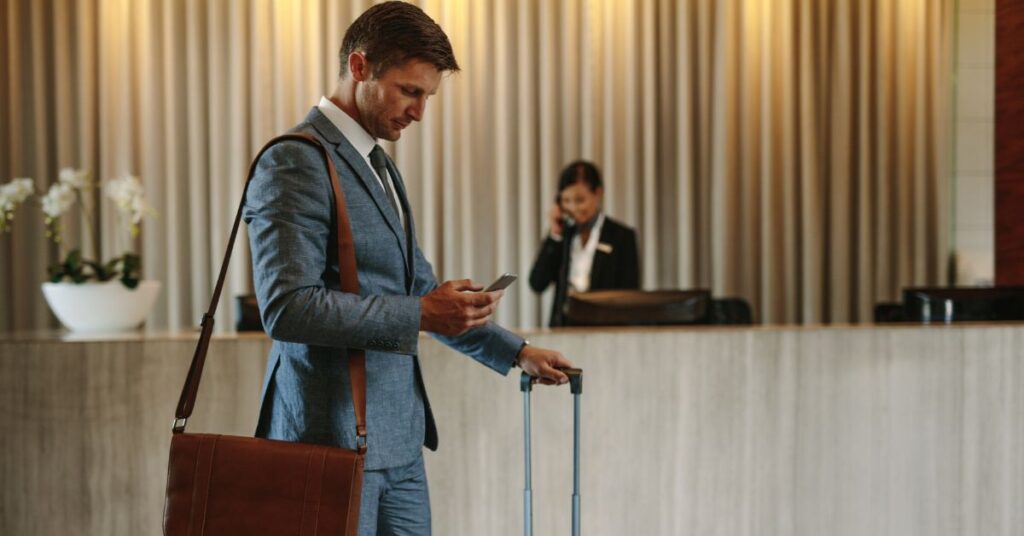11 Cybersecurity Tips For Business Travel

Table of Contents
The convenience of connectivity in business travel often comes with hidden risks, turning your business trip into a playground for cybercriminals. Much like venturing down a dimly lit street at night, connecting to public Wi-Fi, whether free or paid, exposes you to unseen dangers lurking in the digital shadows. This seemingly harmless act of using public networks can open the door to cyber threats, allowing malicious activities such as unusual credit card transactions to slip unnoticed.
As a business traveler, navigating these virtual streets cautiously is essential, arming yourself with the knowledge and tools to stay protected in an environment ripe for digital exploitation.
Cybersecurity Tips For Safe Business Travel
Business travel is sometimes essential for growing businesses. Use these cybersecurity tips below to help you stay safe on your business travels.
1 – Use VPNs for Secure Connections
When traveling for business, ensure your online activities are protected by using a Virtual Private Network (VPN). A VPN encrypts your internet connection, safeguarding sensitive business data from potential eavesdroppers, particularly on public Wi-Fi networks.
2 – Enable Two-Factor Authentication
Activate two-factor authentication (2FA) to fortify the security of your business accounts. This extra security step requires a second form of verification, such as a code sent to your mobile device. Doing so can significantly enhance your defenses against unauthorized access when working remotely.
3 – Beware of Public Wi-Fi Networks
Public Wi-Fi can be a breeding ground for cyber threats. Be particularly vigilant about networks with similar names, as hackers could use this tactic to mimic legitimate connections. Confirm the official Wi-Fi network with your hotel or business suite to avoid networks that could be trapped. One example is two Wi-Fi’s with similar names, “Hilton Wifi” and “Hilton Public Wifi.” If the legitimate Wifi is “Hilton Wifi,” a hacker could set up their Wifi name to be similar enough for people to click on without realizing it, such as “Hilton Public Wifi.”
4 – Download Hospitality Apps Before Your Trip
Before embarking on your business journey, download all necessary hospitality apps from a secure connection. This precaution prevents the risk of downloading fraudulent apps over insecure networks while traveling.
5 – Disable Auto-Connect Features Like Bluetooth
Disable settings that allow your devices to connect automatically to Wi-Fi and Bluetooth networks. This proactive measure prevents your devices from inadvertently connecting to insecure or malicious networks, safeguarding your business information.
6 – Use Strong and Unique Passwords with a Password Manager App
Adopting strong and unique passwords for each account is crucial in protecting your business data. You can use a password manager app to securely manage these passwords and ensure they are safe while on the go.
7 – Be Cautious of Public Charging Stations
Avoid using public USB charging stations when possible, as they could be compromised to inject malware into your devices. Use your personal chargers or power bricks to keep your devices charged and secure.
8 – Educate Yourself About Phishing Scams
Stay informed about the latest phishing scams to protect your business information. Be cautious of unexpected requests for personal information or suspicious links, especially when accessing your email or corporate networks while traveling on public Wi-Fi.
9 – Limit Sensitive Data on Your Devices
Minimize the amount of sensitive information stored on your devices when you travel. In the event of loss or theft, this reduces the risk of accessing confidential business data.
10 – Turn Off NFC (Tap to Pay)
When not in use, disable NFC features like ‘tap to pay’ on your devices. This can help prevent unintended or unauthorized transactions and safeguard your financial information while traveling.
11 – Use Credit Cards Instead of Debit Cards
For business travel expenses, opt for credit cards rather than debit cards. Credit cards typically offer better protection against fraud and unauthorized transactions, keeping your financial resources secure.
For more information on protecting your data when you travel for business, contact a CyberGate IT expert today!
